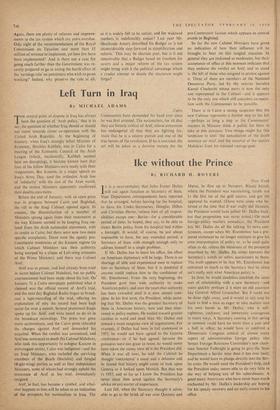Ike without the Prince
By RICHARD H. 12OVERE TT is a near-certainty that John Foster Dulles will not again function as Secretary of State. State Department correspondents have reported that he arranged, before leaving for the hospital, to have his Under-Secretaries, Douglas Dillon and Christian Herter:relieve him of all respon- sibilities except one— Berlin—for a considerable period of time; he hoped, they say, to be able to direct Berlin policy from his hospital bed within a fortnight. It would, of course, be just about impossible to have, for any extended period, a Secretary of State with strength enough only to address himself to a single problem. '
If Mr. Dulles has to leave his office, the effect on American diplomacy will be large. There is no shortage of able and experienced men to replace him as Secretary of State, but it is doubtful if anyone could replace him in the confidence of Mr. Eisenhower. From the very beginning, the President gave him wide authority to make American policy, and over the years that authority has been extended until it is now almost com- plete. In his first term, the President, while insist- ing that Mr. Dulles was the greatest Secretary of State in American history, now and then inter- vened in policy matters. He tended toward greater caution in word and deed than Mr. Dulles and toward a more sanguine view Of negotiations. For example, if Dulles had been 'in full command in 1955, he would not have agreed to the Geneva conference—or if he had agreed, because the pressures were too great to resist, he would never have taken the sunny view of it the President did. When it was all over, he told the Cabinet he thought 'coexistence' a snare and a delusion and he feared that history might come to look upon Geneva as it looked upon Munich. But that was in 1955, and so far as I know the President has never since then acted against the Secretary's advice on any matter of importance.
Last fall, when the Secretary thought it advis- able to go to the brink of war over Quemoy and New York Matsu, he flew up to Newport, Rhode Island, where the President was vacationing, strode out to the first tee of the golf course. and got the approval he wanted. (There were some who be- lieved at the time that if war really did threaten, the President would have pulled Mr. Dulles back, but that proposition was never tested.) On most foreign-policy 'matters nowadays., the President lets Mr. Dulles do all the talking. In news con- ferences, except when Mr. Eisenhower has a pre- pared statement he no longer attempts to give his own interpretation of policy or, as he used quite often to do, relieve the bleakness of the prospects described by Mr. Dulles. He either borrows the Secretary's words or refers questioners to them. The truth appears to be that Mr. Eisenhower has entrusted so much to the Secretary that he often isn't really sure what American policy is.
In time, he would doubtless establish the same sort of relationship with a new Secretary—and more quickly perhaps if it were an old associate like General Alfred Grucnther. But it could not be done right away, and it would in any case be hard to find a man as eager to take matters into his own hands as Mr. Dulles, who is self- righteous, cocksure, and immensely courageous in many ways. A Secretary coming in this spring or summer could have no more than a year and a half in office; he would have to confront a Democratic Congress critical of almost every aspect of administration foreign policy (the Senate Foreign Relations Committee's new chair- man Senator Fulbright is going to give the State Department a harder time than it has ever had); and he would have to plunge directly into the Ber- lin crisis. He would need the President's help, and the President today seems able to do very little in the way of helping any of his subordinates. A good many Americans who have never been much enchanted by Mr. Dulles's leadership are hoping for his speedy recovery and an early return to his • office.


































 Previous page
Previous page